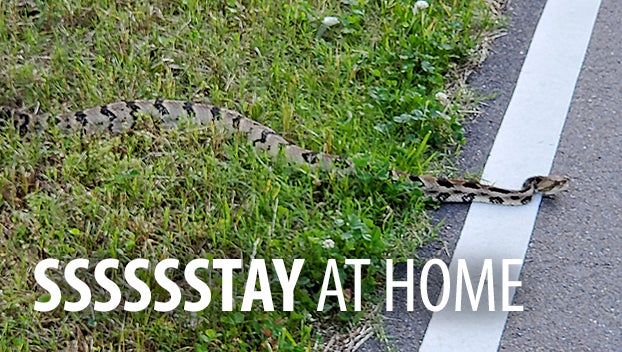Beware, sizzling hot summer brings out slithering snakes
Published 6:30 pm Wednesday, June 8, 2022

- Curtis Moroney said he likes to go on bicycle rides along the Natchez Trace Parkway each evening and recently took this picture of a four-and-a-half-foot-long rattlesnake on one of his rides. (submitted photo)
|
Getting your Trinity Audio player ready...
|
Snakes are liking this warm weather and are out moving around. According to the Mississippi Department of Wildlife Fisheries & Parks (MDWFP), Snakes have to warm up their body temperature so they can be more active for finding mates, producing offspring and to search for food. Beware of slithering snakes if you are out working in your food plots, game trails or stands/blinds.
Mississippi State’s Extension Office said people should pay particular attention when walking in tall grass, around brush piles, next to fallen logs and in wooded areas. Be cautious when moving items outside such as old boards, metal and toys left on the ground. Wear long pants and boots (or at least shoes that cover your ankles) when in areas where snakes could be.
There are over 50 species of snakes in Mississippi with only 6 types being venomous. However, even non-venomous snakes can still bite and have the potential for leaving a nasty infection. It is not always easy to distinguish one type from another, so the best action is to leave all snakes alone.
Approximately 75% of snake bites happen when a person is trying to kill or otherwise harass it. Snakes are not aggressive. Snakes bite only when they are threatened. Most try to avoid people or lie motionless in an effort to blend into their surroundings and escape notice.
What to do if you are bitten by a snake?
- Remain calm; don’t panic.
- Remove constricting items such as rings, bracelets, shoes.
- Wash wound area.
- Immobilize the area if possible.
- Keep bitten areas at or below heart level.
- Get to a medical treatment facility as quickly as possible.
Did you know a snake’s diet consists of rats, mice, moles and other pests, helping to control those populations. They can climb trees, can bite underwater, and may enter saltwater.
People should treat dead snakes as you would live snakes. They can still bite and inject venom even from a cut off head.
No fumigants, toxicants, or repellents are registered for snake control. Diet, body temperature, and other biological aspects of snakes complicate the potential for developing such snake controls.
The same antivenin is used for all bites from venomous snakes in MS except the coral snake. If you are attempting to identify a snake, make sure you are not within its striking distance, which is usually 2/3 of the snake’s body length.






